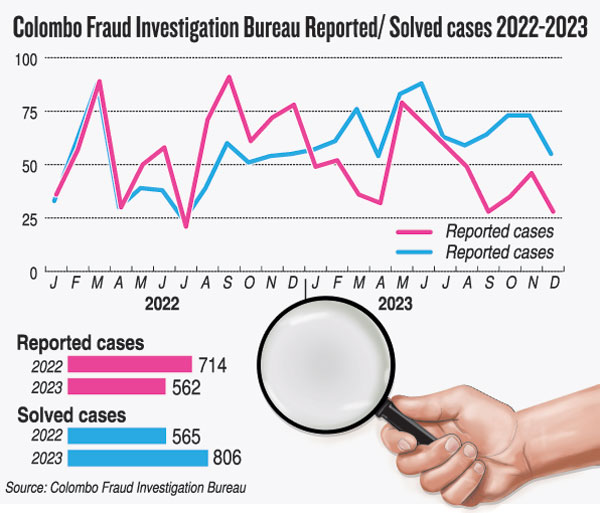News
Use of dodgy documents on the rise
View(s):By Kasun Warakapitiya
The Registrar of Motor Vehicles, Registrar of Persons, Immigration and Emigration, Customs, Inland Revenue, Labour, Customs and the Department of Pensions are among the many government offices that have noted this spike, said CFIB Director Senior Superintendent Jagath Seram. Forged documents are also submitted for loans.
His office has also observed an increase in forged papers presented to foreign embassies, including fake bank statements and personal details. This is due to more people wanting to go abroad, he said.
The suspects were often unaware that foreign missions coordinate with and report these incidents to the CFIB. “We now receive around five to six cases a week,” SSP Seram said.
Last year, CFIB listed 562 new cases of forged documents. Along with cases left over from the previous year, they solved 806. In 2022, the total number of cases was 714, and just 565 were solved (around 20% of cases are carried over owing to issues such as delays in obtaining evidence).
Complaints fall under five breaches of the Penal Code: cheating, collegiate documents, criminal misappropriation of property, criminal breach of trust, and polygamy.
Fraudulent vehicle deals—usually false registrations—commonly come to light when the RMV contacts the originator of the transaction to ask whether he or she has any objections. It is only then that they discover that ownership had been transferred without their knowledge.
Recently, two vans were detected with identical registration numbers and paperwork in what turned out to be a complicated case involving multiple wrongdoers.

The original van owner complained after he learned from the RMV that someone was attempting to transfer it unbeknownst to him. Manufactured in 1998, the vehicle had been purchased on lease and handed over by him to a woman to run a school service.
In March 2023, however, the RMV contacted him to say the vehicle was being transferred to another party and asked whether he had any objections. The shocked owner then complained about the woman.
But police investigations revealed she had neither sold the van nor given the “vehicle book” to anyone, yet the documents were missing. And the RMV said the request for the transfer of ownership came from someone in Kurunegala.
Additionally, a person from Pothuhera in Kurunegala had also registered a van with the same number in February that year. CIFB investigated two parties—one to see what happened to the vehicle papers and the other to determine how one vehicle had two identical registrations.
It was found that one party had stolen the papers, which got passed from hand to hand until they were pawned. As this party was unable to repay a loan, they tried to transfer the ownership of the van using false signatures and copies of the identity cards of the original owner.
The other party, who had registered a van with the same registration number, notified the police that they had bought it from Anuradhapura.
The police are still trying to uncover where this crime originated. And this, said SSP Seram, is just one of the many cases his office is grappling with.
| Scrutiny to verify authenticity CFIB explained how people can identify forged papers so they can determine if they are being misled, cheated, deceived, or even robbed. CFIB Director SSP Jagath Seram said it was necessary to compare the suspect document with the original one as there can be changes in signatures, stamps and even format. “When we are investigating such crimes, we first request that the government authority, department, or agency provide original documents. We then check the documents with the Government Analyst. Although that office is busy, most times they respond without major delay.” | |
| Punishments inadequate Fines and imprisonment that courts can impose for submitting forged documents should be increased, CFIB Director SSP Jagath Seram said. Suspects are produced under the Penal Code, and a magistrate can hand out a two-year imprisonment as well as specify a fine, according to his or her discretion. For cheating, a judge can hand out a prison sentence of one year and a fine. Someone found guilty of breach of trust can be imprisoned for three years and be subject to a fine. |
The best way to say that you found the home of your dreams is by finding it on Hitad.lk. We have listings for apartments for sale or rent in Sri Lanka, no matter what locale you're looking for! Whether you live in Colombo, Galle, Kandy, Matara, Jaffna and more - we've got them all!

